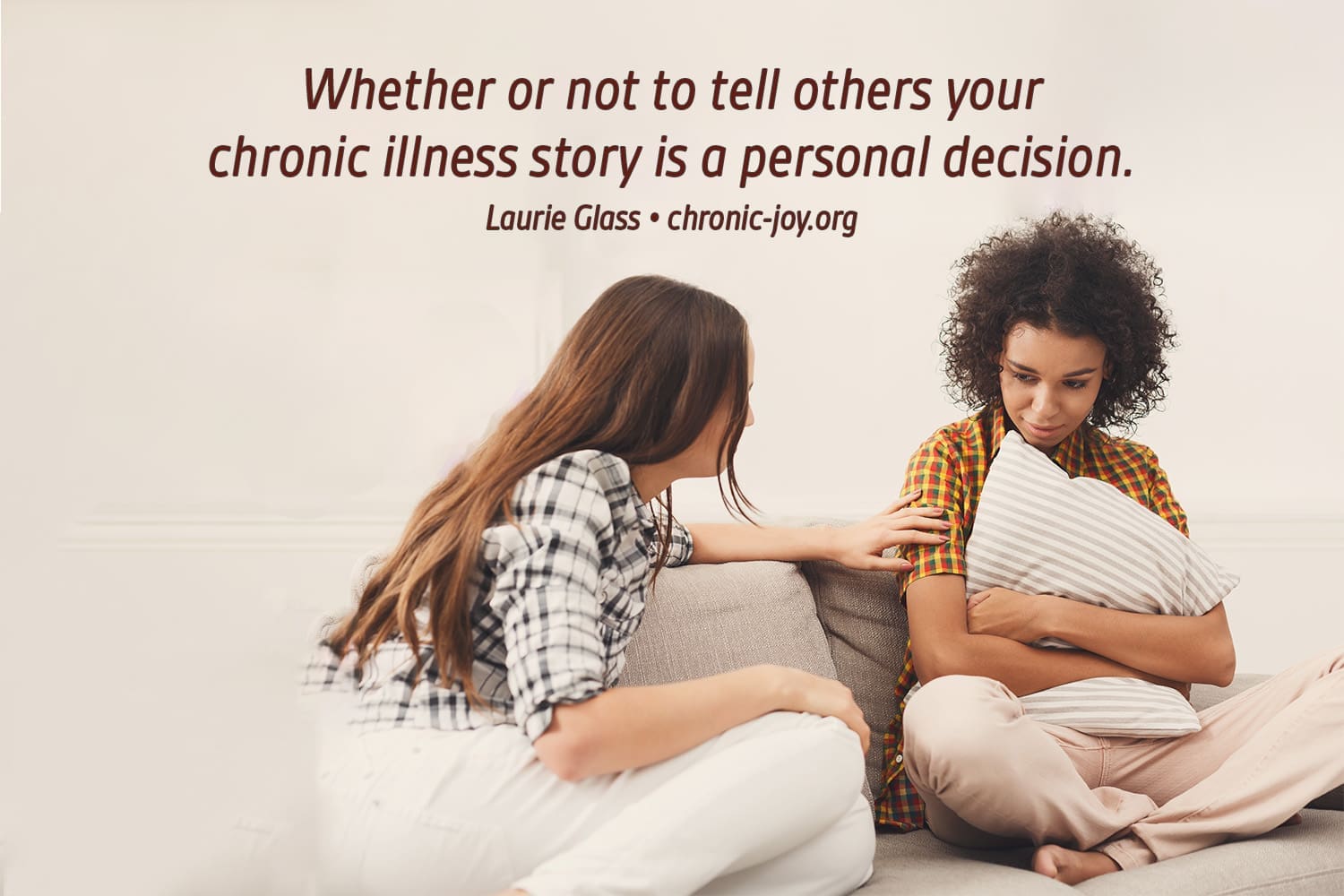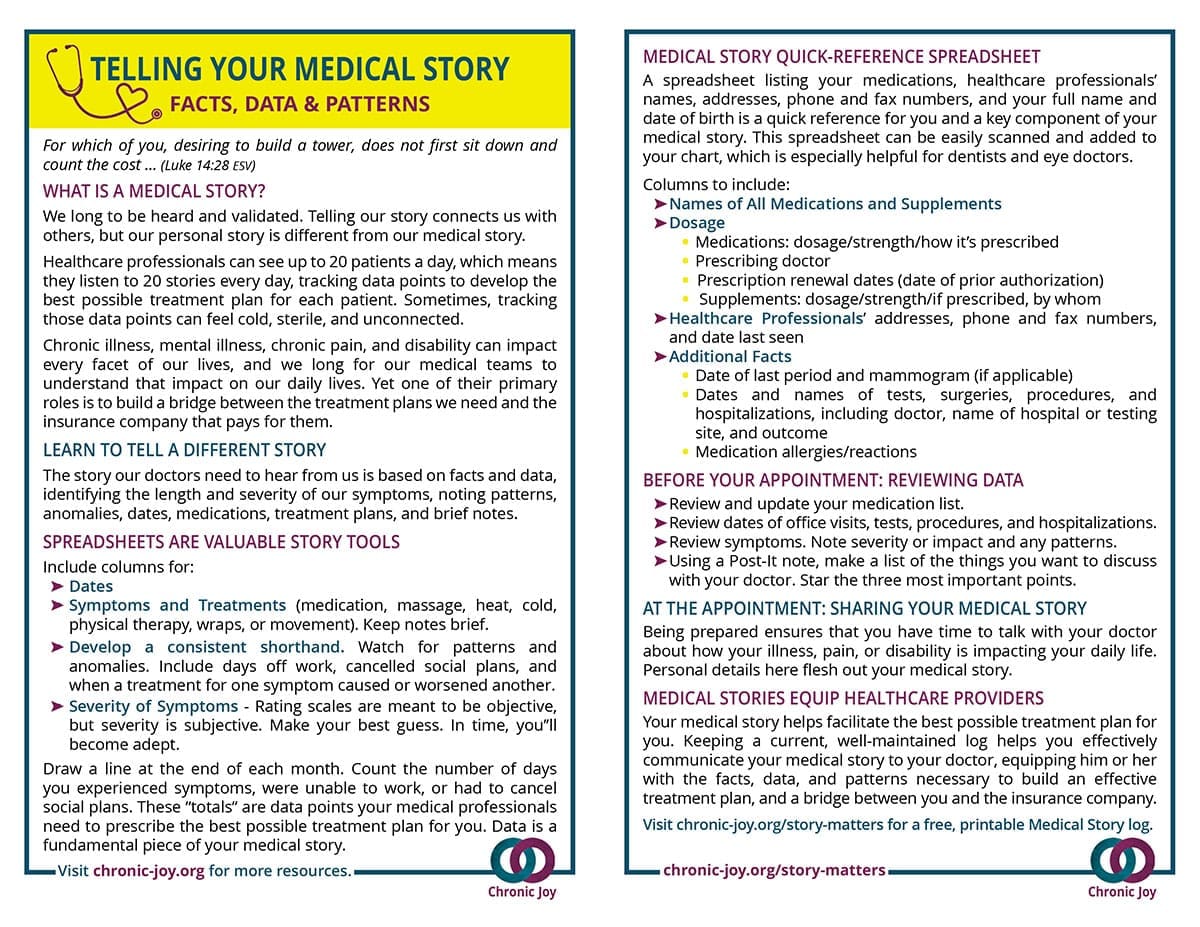
“Whether or not to tell others your chronic illness story is a personal decision.” Laurie Glass
TELLING YOUR MEDICAL STORY
For the Lord gives wisdom; from his mouth come knowledge and understanding. (Proverbs 2:6)
There are no easy answers about who to tell or who not to tell. The obvious first step is to pray. Then, you might ask yourself some key questions to help you decide if now is the right time to begin sharing your story. Additionally, there are specific things to keep in mind as you consider whether to tell your story and even how much to share.
QUESTIONS TO ASK YOURSELF
1. Why do you want to tell your story? Is it to
- educate others about your illness,
- explain why your life is different, or
- something else?
2. Who will you tell? Do you want to share your story with
- the people close to you,
- others in the chronic illness community, or
- every one, you can possibly reach?
3. What will you tell them? Would you tell them
- only about the physical symptoms,
- how it has affected your life, or
- how you cope with it?
4. When will you share your story? Are you ready now, or do you need more time?
5. How do you want to tell others? Do you prefer to tell people
- in person,
- through some type of creative writing, or
- through other means?
As you answer these questions, some thoughts that either reassure or concern you might come to mind. Please pay attention to them, and consider writing about these thoughts in a journal or discussing them with someone you trust. From there, keep the following insights in mind.
INSIGHTS ABOUT TELLING YOUR STORY
1. Remember that once you tell others, you cannot untell them. Therefore, take the time to pray, decide, and prepare.
2. Realize that you do not have to convey everything. You can share about the illness itself and keep it at that. You can include how you processed and accepted it, but you aren’t obligated to.
3. Know that you don’t have to have handled everything just right to tell others. Perhaps you went through a season of being angry, or it took you a long time to accept your changed life. It’s okay to share your struggles if you’re comfortable doing so.
4. Consider that you might be surprised. Someone you did not expect to be supportive might rally beside you. On the other hand, someone you thought would embrace you might not provide the support you expected. Think of how you might guard your heart through the telling process. Have someone trustworthy to talk to if things don’t go as well as you hoped.
5. Consider asking others in the chronic illness community
- how they decided to tell their stories,
- how they shared their stories, and
- how well their stories were received.
If you decide to tell your story, some simple prompts to help you begin are provided below.
A PLACE TO START
1. Whether you plan to tell your story in spoken or written form, consider writing or recording it for now. It’s okay if it’s just in bits here and there. You can organize your thoughts later.
2. To help you put your story together as you move through the process, you might consider addressing the questions below:
- When did your symptoms begin? Were you concerned at the time?
- What was the getting-a-diagnosis journey like? Were you afraid of what you might learn?
- How did the illness change your life? How would you describe the process of accepting these changes?
- How has your experience affected your relationships with others? Have you lost or gained friends? Did it strengthen or complicate family relationships?
- How has being sick affected your relationship with God? Has it been strained, or are you closer to Him?
4. You can practice telling your story to a loved one who already knows it or to someone you know in the chronic illness community. Write out what you would like to share in advance.
5. Include references to resources that explain the details of your chronic illness.
6. Invite others to ask questions if you’re comfortable doing so.
7. Consider telling various versions of your story. For example, you can choose one focus at a time, such as:
- the physical symptoms of your illness;
- the way chronic illness has affected your day-to-day life;
- how chronic illness has influenced your social interactions;
- how you have coped with your chronic illness;
- the illness’ impact on your relationship with God.
You might feel more comfortable sharing certain aspects of your story and not others, and that’s okay. Also, you might want to share one version with one person and a different version with someone else.
LETTING GOD LEAD
Once you’ve prayed, asked yourself key questions, and considered the possibilities for telling your story, hopefully, you’ll know what to do next. If it does not become obvious, that’s okay, too. Take a break from it and revisit this decision at another time. If you decide to tell your story, let God lead you step-by-step. You never know what He may have in mind or the hearts He may be preparing to hear about your chronic illness experience. You may be surprised at how it ministers to others.
AN INVITATION
For more prompts to help you tell your story, check out Chronic Joy’s Story Matters printable


Laurie Glass
Staff Writer
Laurie has a Master's Degree in Christian Counseling and is the author of Coping with ME/CFS. Many of her poems and articles have been published in print and online. She won the Open Medicine Foundation poetry contest in 2019. Laurie loves to use her gift of writing to encourage others. Her book is available on Amazon.

Telling Your Medical Story
What is a Medical Story? In order for our healthcare teams to build the best possible treatment plans for us, we need to learn to keep well-maintained logs with the symptoms and severity, medications, treatments, dates, and brief notes. Keep track with our Medical Story Log.

Recent Comments